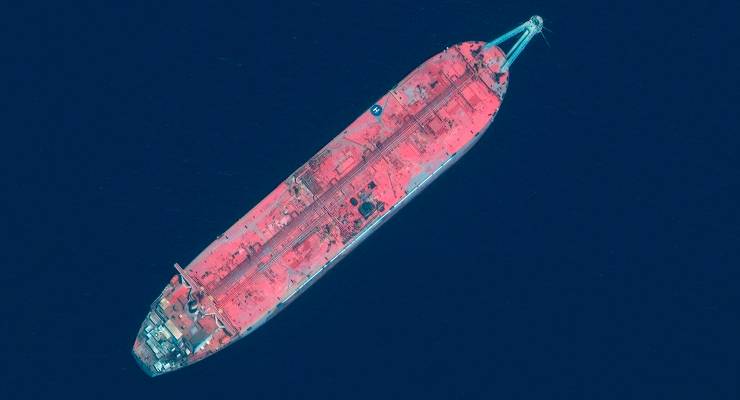
In the midst of the war in Yemen, there is an ecological timebomb ticking just off the coast: a derelict oil tanker that could cause a disastrous oil spill unless immediate action is taken to avert the catastrophe.
Originally used as an offshore storage vessel, the FSO Safer was largely abandoned in 2015 when the Yemeni civil war forced its maintenance and repair operations to come to a halt. After years of decay, aid agencies and environmental groups warn that the rusting tanker — which holds an estimated 1.14 million barrels of oil — is now teetering on the verge of collapse.
If the tanker breaks apart, it could cause one of the largest ocean oil spills in history — bigger than the Amoco Cadiz in France in 1978, the Exxon Valdez in Alaska in 1989, or the Prestige in Spain in 2002 — and cost tens of billions of dollars to clean up.
It is “a ticking timebomb in the Red Sea,” said Ghiwa Nakat, the executive director of Greenpeace for the Middle East and North Africa. “This has been deserted without any maintenance for years now, and the situation is very bad.”
Yemen’s civil war, which has been raging since 2014, drove the country into a full-fledged humanitarian and economic crisis and pushed millions to the brink of famine. The conflict was marked by allegations of war crimes on all sides, including the Iran-backed Houthi rebels purposefully withholding humanitarian aid from civilians in dire straits and the indiscriminate bombing of civilian targets by the Saudi-led coalition supporting the Yemeni government.
The uncertain fate of the FSO Safer is one of the many knock-on effects of the conflict, despite international diplomatic efforts to find a way to safely remove its oil. If the tanker falls apart, the cost of clean-up could amount to US$20 billion, according to estimates from the United Nations.
“With the start of the war, there was no longer a possibility to keep a full crew on board to maintain it,” said David Gressly, the UN’s humanitarian coordinator in Yemen. “Over the last seven years, it’s gradually falling apart. These systems designed for safety have all collapsed.”
The erosion of these systems has drastically increased the chances of either the FSO Safer’s explosion or its complete breakdown, Gressly said, both of which would result in an environmental disaster that could also exacerbate the country’s ongoing economic and humanitarian challenges.
An environmental disaster
Experts warn that the scale of this potential spill would eclipse that of the Exxon Valdez oil spill, which dumped about 11 million gallons (50 million litres) of oil near Alaska in 1989 — roughly one-fourth the oil that the FSO Safer holds. One of the United States’ largest oil spills, the Valdez spill has left an enduring environmental and economic mark on the region, killing hundreds of thousands of wild birds, animals, and fish, and inflicting lasting damage on various species.
“If Safer leaks, the environmental disaster will be four times greater than the Exxon Valdez spill that happened in 1989,” Nakat said. “Alaska’s ecology is still suffering from this spill after more than three decades.”
There’s a new glimmer of hope in Yemen, however, as a new Yemeni government came to power and negotiated a ceasefire with the Houthis that has remained relatively stable, at least so far. This reprieve could potentially offer international envoys a window of opportunity to launch an emergency operation to safely remove the oil.
In March, the UN and the Houthis agreed to a memorandum of understanding to offload the oil from the deteriorating FSO Safer to a temporary vessel over a period of four months. The UN has called for $80 million to fund this emergency transfer, which it says should happen before the fall (autumn in Yemen is in September, October and November) when more volatile weather would make such an operation risky and increase the chance of a possible breakdown.
The Netherlands hosted a UN-led conference on Wednesday to raise funds for the initial phase of such an operation. The proposed operation involves two parts. The first is removing the oil from the FSO Safer to a secure temporary vessel in the next four months to ease the immediate danger of an oil spill. From there, the oil would be moved from the temporary vessel to a long-term replacement vessel, which the UN hopes to install in the next 18 months. Then the FSO Safer would be towed away and sold for salvage.
“$80 million would quickly secure the oil so it’s no longer a threat to the environment,” Gressly said. “But it’s not sustainable, so we do need to bring in a permanent storage capability.”
Beyond the environmental toll, a major oil spill would also have major economic and humanitarian repercussions on a population already strained by years of war. In Yemen, approximately 17 million people are in need of food assistance. Much of that assistance enters through nearby ports — a humanitarian lifeline that could potentially close in the event of an oil spill, the UN said.
A spill would also threaten the livelihoods of the country’s fishing communities, with roughly half a million people employed in the fishing sector.
These impacts are not limited to Yemen, either. “Depending on the season, oil will move into other parts of the Red Sea,” Gressly said. “It could affect the whole Saudi Red Sea coast. It could affect Eritrea, it could affect Somalia, it could affect Djibouti.”
And the window to act is quickly closing.
“The more we lose time, the risk is more imminent,” Nakat said. “It might happen at any point.”










Has there ever been a more stupid species than humanity?
The natural world cannot wait for humanity to roll into eternity along with every then living species that has already ceased to exist.
Exactly my thoughts as I was reading this Graybul.
We are a clever species, not a smart one.
Our cars are electric.
Wasn’t that a Plastic Fantastic song, ca.1996?
Not sure but according to Tubeway Army friends are electric.
‘And the window to act is quickly closing.’
Ditto for planet Earth in general. It’s hard to decide whether human arrogance or ignorance is to blame.
We live in scary times when something like this is relegated to minor news.
Tried to get comment into another paper on topic of non reporting of ecological climate effects. Or if it is printed, way down in a small section.
Just confirms my belief that global corporations pay lip service to any meaningful change towards environment.
MSM also very concentrated and all have vested interest to maintain the status quo.
Hence no serious reporting.
Agree with comment – humans are a breed not compatible with harmonious living with nature.
And this disaster is only one of dozens currently affecting our lives.
The Holy Trinity: The Coal, The Oil and the Holy Gas.
Others of us have faith in The Sun, The Weather and The Hydrogen Gas.
The last seems to be a good summary of ScoMo’s personality profile.
So who owns the vessel? Why aren’t they paying? And why is it any sort of practice to store huge amounts of crude oil in old ships moored close to shore (or anywhere, for that matter).